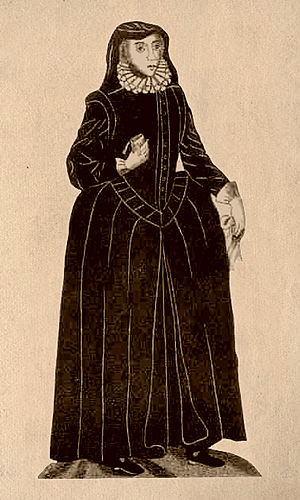Anne Turner (murderer) facts for kids
Quick facts for kids
Anne Turner
|
|
|---|---|

Turner on the way to the gallows
|
|
| Born |
Anne Norton
5 January 1576 Hinxton, Cambridgeshire, England
|
| Died | 15 November 1615 (aged 39) |
| Cause of death | Hanging |
| Resting place | Tyburn, Middlesex |
| Nationality | English |
| Occupation | maidservant |
| Employer | Frances Carr, Countess of Somerset |
| Known for | Complicity in murder of Sir Thomas Overbury |
| Opponent(s) | |
| Spouse(s) | Dr. George Turner |
| Parent(s) | Thomas Norton Margaret Norton |
Anne Turner (born January 5, 1576 – died November 15, 1615) was an English woman who lived in London. She was known for her role in a famous poisoning case in 1613. She was later executed for her part in the death of Sir Thomas Overbury. Her story has even been mentioned in several plays and novels.
Contents
Early Life and Connections
Anne Norton was born on January 5, 1576, in Hinxton, Cambridgeshire. She was one of six children born to Thomas and Margaret Norton. Later, some rumors suggested she might have been connected to a London apothecary (someone who prepared medicines) and astrologer named Simon Forman.
Anne was considered a beautiful woman. She married a doctor named Dr. George Turner, who passed away in 1610. After her husband's death, she became a "waiting woman" or companion to Frances Howard.
At this time, Frances Howard was married to the Earl of Essex. However, she had fallen in love with Robert Carr, who was a favorite of the king. Frances wanted to marry Robert Carr.
The Problem with Sir Thomas Overbury
Sir Thomas Overbury was Robert Carr's mentor and friend. He did not approve of Frances Howard and Robert Carr getting married. This disapproval became a big problem for Frances. Her uncle, Sir Henry Howard, 1st Earl of Northampton, and Anne Turner seemed to work together to try and discredit Overbury.
The Overbury Case
Sir Thomas Overbury was arrested on charges that many believed were made up. Frances Howard would benefit from his death because it would remove the main person opposing her marriage to Robert Carr.
Anne Turner was a widow and ran her own business. She had a successful monopoly on a special yellow starch. This starch was used to color collars and ruffs, which were very fashionable at the time. Because of her business, Anne Turner knew many people, both at court and in other parts of London society.
The Plot to Poison Overbury
Anne Turner helped Frances Howard connect with different people. She helped Howard get poisons, including arsenic and other dangerous substances, from an apothecary named Franklin. These poisons were then put into tarts and jellies.
The poisoned food was given to Richard Weston, who was Overbury's jailer. It was then left with Sir Gervase Helwys, the Lieutenant of the Tower. Overbury ate the food and died in September 1613.
A few weeks after Overbury's death, Frances Howard's marriage was ended. She was then able to marry Robert Carr.
Trial and Punishment
Two years later, the truth about Overbury's murder came out. Anne Turner, Helwys, and others involved in the crime were put on trial. Important judges like Sir Edward Coke, the Lord Chief Justice, and Sir Francis Bacon, the king's Attorney General, oversaw the trials.
There was a lot of evidence against Anne Turner. She confessed to her part in the crime. When the judge gave her sentence, he called her a "felon" and a "murderer."
Anne Turner was executed by hanging at Tyburn on November 15, 1615. It is said that the hangman wore yellow-colored clothing, matching the yellow starch Anne Turner was famous for. After her execution, yellow starch went out of fashion. Her body was taken to St Martin-in-the-Fields church for burial.
In Stories and Books
Anne Turner's story has appeared in many fictional works:
- She is a character in Thomas Costain's 1942 historical novel For My Great Folly.
- Jean Plaidy's novel, The Murder in the Tower (1964), also features Anne Turner.
- Nathaniel Hawthorne's The Scarlet Letter mentions Anne Turner.
- She is a character in the 1930 novel The King's Minion by Rafael Sabatini.
- The novel A Net for Small Fishes (2021) by Lucy Jago explores the relationship between Anne Turner and Frances Howard.
- Dame Ursula Suddlechop in Sir Walter Scott's novel The Fortunes of Nigel talks about "poor Mistress Turner."
See Also
 | May Edward Chinn |
 | Rebecca Cole |
 | Alexa Canady |
 | Dorothy Lavinia Brown |

